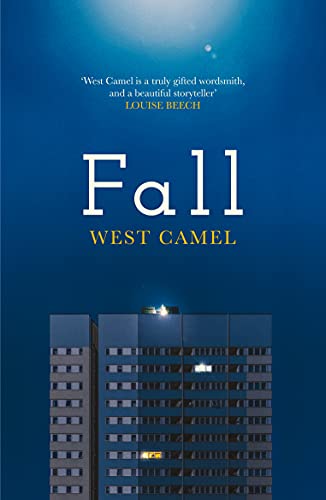5 Stars
I couldn’t help but fall for Fall. There is so much to unravel in this multi-layered novel that I could write several critical analysis articles.
Aaron and Clive Goldsworthy are 62-year-old twins who have been estranged for over 40 years. Aaron is the sole occupant of Marlowe Tower, part of a 1970s housing development designed by their mother Zöe on the banks of the Thames in southeast London. Clive is a successful property developer who wants to turn the tower into luxury flats, but Aaron refuses to move. When Annette and Christine Mayfield, a pair of black twins who lived in the tower in the 1970s, move back in, both Aaron and Clive must confront what happened the summer of 1976 and its aftermath.
From the beginning, there are many unanswered questions: Why are the twins estranged? Flashbacks to 1976, when the two were 18, show them being so close that they have a psychic connection. Now they live across the river from each other but haven’t communicated for four decades. What happened? Why do both of them fear the return of the two black women? When Aaron and Clive first met this slightly older pair of twins, they were immediately drawn to them and spent a great deal of time in their company.
Characterization is amazing. All characters are complex and flawed; in other words, they are realistic. At times I would feel compassion for someone and at another time, frustration with them. What especially impressed me is the characterization of the twins. Both direct and indirect characterization techniques are used. We are told that “Clive dislikes – intensely dislikes – having his plans thwarted” and that Aaron is so “infuriatingly obdurate” that he “can never be persuaded of anything.” Then we are shown these traits in their actions and thoughts. I had no difficulty distinguishing Aaron and Clive. Clive is the leader in that he is more forthright, whereas Aaron is rather diffident. The same is true of the women: Annette is more like Clive, while Christine is more similar to Aaron.
I found Zöe such a fascinating character that I’ve added her to my list of fictional characters I’d love to meet in real life. She is a strong, forceful person with a take-charge attitude. As an architect, she is able to help dictate how people move around, and she tries to do this with her family as well. It becomes obvious, however, that her sons do not know her as well as they think. Aaron’s comment that Zöe is complicated is really an understatement. As an architect, she struggled in a male-dominated field and had to make difficult choices between motherhood and professional advancement. Though she tried to build a space where people from different walks of life would live together and even moved her family there, she continued to send her sons to schools outside the area. Though supposedly concerned with egalitarianism, her including secret corridors and hidden doors in the building just for herself and her sons suggests a sense of ownership and superiority. I found myself aghast at some of her choices and in awe of others, but always she behaves in keeping with her personality and priorities.
Though it is Zöe who is described as having a God complex, the narrator also behaves like a divine entity. The omniscient point of view is carried to an extreme. In the novel’s opening, for example, the reader is given a bird’s eye view of London before being invited to swoop down: “We can drop even lower” and “And you might, if you trusted your wings enough to take you down even further, notice . . .”. The narrator has unlimited access to all his characters and reveals their thoughts and gestures in minute detail, thereby developing character - though he also withholds information to create suspense. It is the point of view that makes for such a satisfying closing in the last chapter.
The book examines a number of issues; one of the major ones is racism. Annette and Christine experience prejudice on a regular basis once they move into the housing complex. As events unfold, it becomes clear that racism determines the fates of virtually everyone, not just those of the black characters. Zöe’s options, for instance, are restricted not just because of gender discrimination but also because of society’s attitudes towards blacks.
The title is perfect because it works on so many levels. There are physical falls, fallings-out, and lives falling apart. The housing estate is falling apart. Reading the novel is a process of slowly watching everything fall into place. And how perfect is it that the last word in the book is fall!?
There is so much more I could discuss because there are so many admirable qualities: the elegant prose, the symbolic use of architecture, and the subtly foreshadowed plot twists. There is a great deal of tragedy because so much is lost by so many, but that does not mean there is no hope. I could criticize the slow pace at the beginning and some coincidental meetings , but that would be caviling. This is an extraordinary novel, both immersive and impactful.

No comments:
Post a Comment